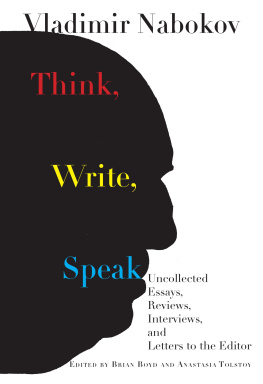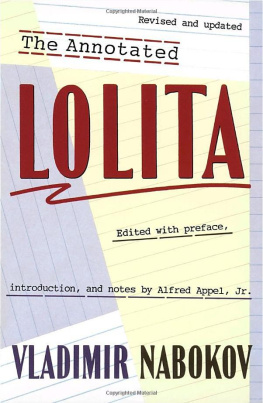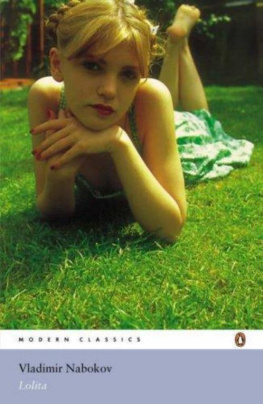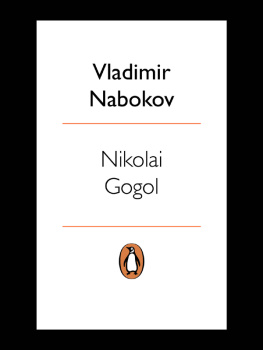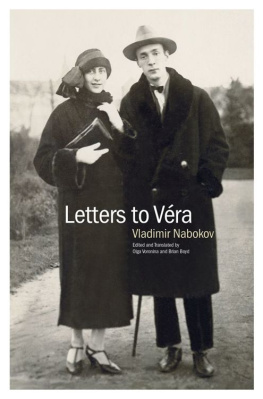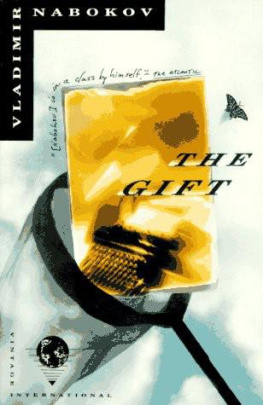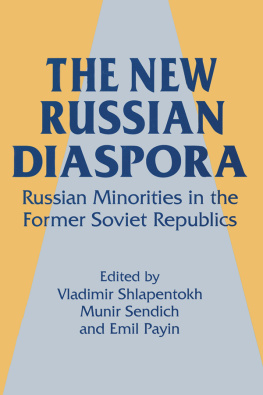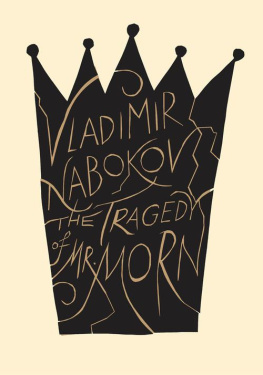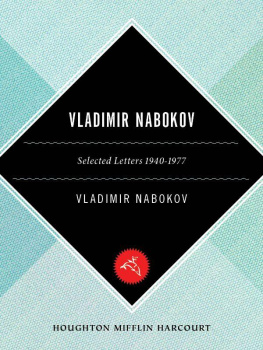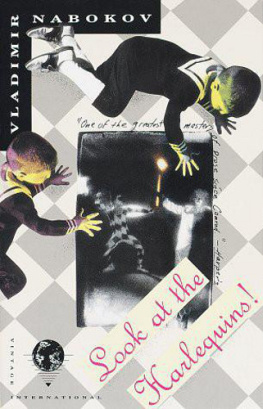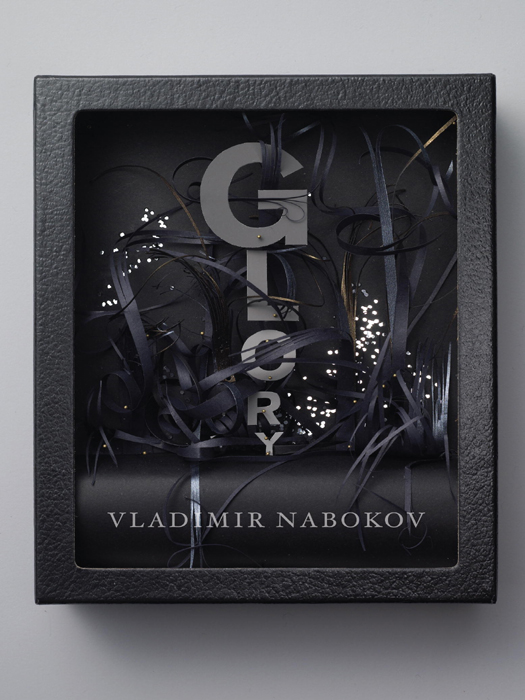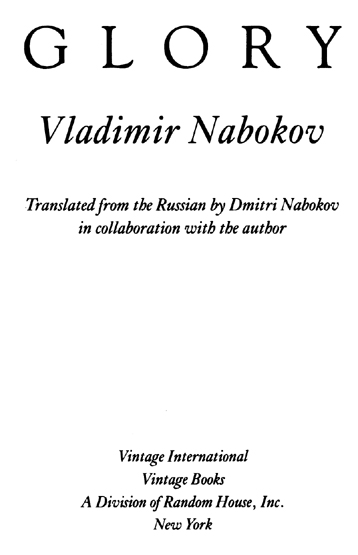BOOKS BY Vladimir Nabokov
NOVELS
Mary
King, Queen, Knave
The Luzhin Defense
The Eye
Glory
Laughter in the Dark
Despair
Invitation to a Beheading
The Gift
The Real Life of Sebastian Knight
Bend Sinister
Lolita
Pnin
Pale Fire
Ada, or Ardor: A Family Chronicle
Transparent Things
Look at the Harlequins!
The Original of Laura
SHORT FICTION
Nabokovs Dozen
A Russian Beauty and Other Stories
Tyrants Destroyed and Other Stories
Details of a Sunset and Other Stories
The Enchanter
DRAMA
The Waltz Invention
Lolita: A Screenplay
The Man from the USSR and Other Plays
AUTOBIOGRAPHY AND INTERVIEWS
Speak, Memory: An Autobiography Revisited
Strong Opinions
BIOGRAPHY AND CRITICISM
Nikolai Gogol
Lectures on Literature
Lectures on Russian Literature
Lectures on Don Quixote
TRANSLATIONS
Three Russian Poets: Translations of Pushkin,
Lermontov, and Tiutchev
A Hero of Our Time (Mikhail Lermontov)
The Song of Igors Campaign (Anon.)
Eugene Onegin (Alexander Pushkin)
LETTERS
Dear Bunny, Dear Volodya:
The Nabokov-Wilson Letters, 19401971
Vladimir Nabokov: Selected Letters, 19401977
MISCELLANEOUS
Poems and Problems
The Annotated Lolita

FIRST VINTAGE INTERNATIONAL EDITION, NOVEMBER 1991
Copyright 1971 by Article 3C Trust
under the Will of Vladimir Nabokov
All rights reserved under International and Pan-American Copyright Conventions. Published in the United States by Vintage Books, a division of Random House, Inc., New York, and distributed in Canada by Random House of Canada Limited, Toronto.
Originally published in hardcover by McGraw-Hill International, Inc.,
New York, in 1971. This edition published by arrangement with the Estate of Vladimir Nabokov.
Library of Congress Cataloging-in-Publication Data
Nabokov, Vladimir Vladimirovich, 18991977.
[Podvig. English]
Glory / Vladimir Nabokov; translated from the Russian by
Dmitri Nabokov in collaboration with the author.
1st Vintage International ed.
p. cm.
Translation of: Podvig.
Originally published by McGraw-Hill International
in 1971Verso of t.p.
eISBN: 978-0-307-78757-6
I. Title.
PG3476.N3P613 1991
891.7342dc20 91-50488
Cover art by Martin Venezky/Appetite Engineers
Cover photograph by Alison Gootee
v3.1
To Vra
Contents
Foreword
The present work closes the series of definitive English versions in which my entire set of nine Russian novels (written in Western Europe between 1925 and 1937, and published by migr houses between 1926 and 1952) is available to American and British readers. He who cares to scan the list given below should mark the dramatic gap between 1938 and 1959:
Mashenka, 1926 (Mary, 1970)
Korol, Dama, Valet, 1928 (King, Queen, Knave, 1968)
Zashchita Luzhina, 1930 (The Defense, 1964)
Soglyadatay, 1930 (The Eye, 1965)
Podvig, 1932 (Glory, 1971)
Kamera obscura, 1933 (Laughter in the Dark, 1938)
Otchayanie, 1936 (Despair, 1966)
Priglashenie na Kazn, 1938 (Invitation to a Beheading, 1959)
Dar, 1952 (The Gift, 1963)
The present translation is meticulously true to the text. My son took three years, on and off, to make a first draft, after which I spent three months preparing a fair copy. The very Russian preoccupations with physical movement and gesture, walking and sitting, smiling and glancing from-under-the-brows, seems especially strong in Podvig, and this made our task still tougher.
Podvig was begun in May 1930, immediately after my writing Soglyadatay, and completed by the end of that year. My wife and I, who were then still childless, rented a parlor and bedroom on Luitpoldstrasse, Berlin West, in the vast and gloomy apartment of the one-legged General von Bardeleben, an old gentleman solely occupied in working out his family tree; his large brow had a somewhat Nabokovian cast, and, indeed, he was related to the well-known chess player Bardeleben, whose manner of death resembled that of my Luzhin. One day in early summer Ilya Fondaminski, chief editor of the Sovremennye Zapiski, arrived there from Paris to buy the book na kornyu, in the rooted state (said of grainfields before they are harvested). He was a Social-Revolutionist, a Jew, a fervent Christian, a learned historian, and an altogether delightful man (later murdered by the Germans in one of their extermination camps), and vividly do I remember the splendid zest with which he slapped his knees before rising from our grim green divan after the deal had been clinched!
The bookscertainly very attractiveworking title (later discarded in favor of the pithier Podvig, gallant feat, high deed) was Romanticheskiy vek, romantic times, which I had chosen partly because I had had enough of hearing Western journalists call our era materialistic, practical, utilitarian, etc., but mainly because the purpose of my novel, my only one with a purpose, lay in stressing the thrill and the glamour that my young expatriate finds in the most ordinary pleasures as well as in the seemingly meaningless adventures of a lonely life.
It would make things too easy for a certain type of reviewer (and particularly for those insular innocents whom my work affects so oddly that one might think I hypnotize them from the wings into making indecent gestures) were I to point out the faults in the novel. Suffice it to say that, after all but lapsing into false exotism or commonplace comedy, it soars to heights of purity and melancholy that I have only attained in the much later Ada.
How do the main characters of Glory stand in relation to those of my other fourteen (Russian and American) novels?the human-interest seeker may ask.
Martin is the kindest, uprightest, and most touching of all my young men; and little Sonia, of the lusterless dark eyes and coarse-looking black hair (her father, judging by his name, had Cheremissian blood), should be acclaimed by experts in amorous lure and lore as being the most oddly attractive of all my young girls, although obviously a moody and ruthless flirt.
If Martin to some extent can be considered a distant cousin of mine (nicer than I, but also much more naive than I ever was), with whom I share certain childhood memories, certain later likes and dislikes, his pallid parents, per contra, do not resemble mine in any rational sense. As to Martins Cambridge friends, Darwin is totally invented, and so is Moon, but Vadim and Teddy existed in the reality of my own Cambridge past: they are mentioned under their initials, N.R. and R.C., respectively, in my Speak, Memory, 1966, Chapter Thirteen, penult paragraph. The three staunch patriots, dedicated to counter-Bolshevist work, Zilanov, Iogolevich, and Gruzinov, belong to that group of people, politically situated just to the right of the old Terrorists and just to the left of the Constitutional Democrats, and as far from Monarchists on one side as from Marxists on the other, whom I was well acquainted with in the entourage of the very magazine which serialized


